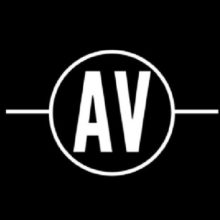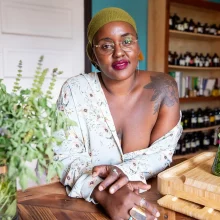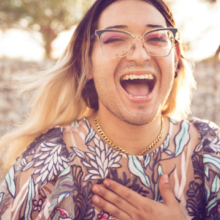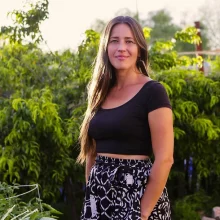
Interview with Angel Soto and Rusty Ramirez –
Love & Mutual Aid In The Time of Covid
June 2021 | Interview by: Raye Winch | Photos by: Rachel Castillo

Angel Soto and Rusty Ramirez; partners and founders of Dos Bellotas.
Angel Kunzman Soto and Rusty Ramirez are the creators of Dos Bellotas, a project that began as emergency response during COVID with a larger vision of supporting building autonomous communities. Beginning with food, firewood, and PPE deliveries to the Navajo Nation early in the COVID pandemic and now pivoting to building sustainable, affordable homes to address the Tucson housing crisis, Rusty and Angel and Dos Bellotas are responsive to the needs of their community.
To discover more, visit PeopleSparkingChange.org

Angel Soto; stands at the fence line of a new construction site near 18th st. and 6th ave.


Transcripts English
Raye Winch:
Today, we’re speaking with Angel Kunzman Soto and Rusty Ramirez, creators of Dos Bellotas. Angel is a Puerto Rican artist and proud member of the food and beverage industry. They’ve spent the last decade in Arizona and were born and raised in Lenapehoking, also known as New Jersey. Rusty was born in Tucson, but grew up in Mammoth, Arizona. They’re an indigenous baker and chef with a focus on foods from the Sonoran Desert. Rusty and Angel, what is Dos Bellotas?
Angel Kunzman Soto:
So Dos Bellotas is really a project where we wanted to focus on like food sovereignty and just like ways in which that we can be a part of building like autonomous communities.
Raye:
How did Dos Bellotas get started?
Rusty Ramirez:
Last May I saw that a mutual friend of mine was tagged in a post asking for, um, emergency donations, uh, for, during COVID in White Cone, Arizona. And I was like, well, I know this person, so we’re going to go and we’re going to do this. And so we put a call out for donations online and we offered to go to everyone’s house to pick up the donations and our friend Eureka put a box at the Steinfeld Warehouse asking for donations. And it kind of snowballed from there.
Raye:
What was, it like that moment of decision to go from seeing a Facebook post to taking action, especially in that time early in COVID when there was so much fear and uncertainty?
Rusty:
I think it was right after the Navajo nation had just gotten of a faulty shipment of PPE and it’s, it’s almost like it’s like a smallpox thing, but in a different way. Yeah. And so we were, we were really angry.
Angel:
My entire family is still in New Jersey and a little bit in Pennsylvania, but, um, at the time it was the Navajo Nation and then it was New York and New Jersey had the highest rates of COVID. And I felt really angry because we were here in Tucson and it felt like no one was taking it seriously. But in the meantime, my family had already been under lockdown for however many weeks. Yeah. And I was like, who would help my family if like, if I was there, I would be with my family right now. But, um, I can’t like, I can’t do anything for them. So…
Raye:
How do your own identities fit into how you view this work and how you relate to this work?
Rusty:
Being an indigenous person and seeing the indigenous people be overlooked because somebody wants to like capitalize off of it for whatever reason. That’s, that’s the was a big driving force.
Raye:
With this project, you were responding to a really acute need. I’m wondering where you’re feeling called today.
Rusty:
We started talking about, um, what’s going on with housing in Tucson right now. And the fact that I, I could not believe that the rent in Tucson jumped by 30%. We’ve talked to some folks here in town and we’re going to be working with Cuadro design and Monica Jones.
Angel:
Yeah, Cuadro and the Outlaw project.
Rusty:
We’re going to focus on building houses, sustainable, sustainable, affordable housing.
Raye:
Do you have any advice for other activists?
Rusty:
Don’t let your ego get in the way.
Angel and Rusty:
Oh yeah. There’s two things. Take care of yourself and don’t get burnt out. Don’t overextend yourself and burn out. Don’t let your ego drive you to do things. No glorification of burn out.
Rachel Castillo:
Thanks for listening to Amplifying Voices. For the full interview, photos and more visit people peoplesparkingchange.org.

Above: Angel and Rusty stand at a construction site located at the intersection of
Stone/18th St and 6th Ave, where Barrio Viejo and Armory Park neighborhoods meet.
Below:
Angel and Rusty stand outside a local taqueria at a Tucson intersection that is being rapidly developed. Rusty and Angel walk along the fence of the construction zone.


Transcripciones Español
Raye Winch:
Hoy hablamos con Angel Kunzman Soto y Rusty Ramirez, creadores de Dos Bellotas. Angel es unx artista puertorriqueñx y miembrx orgullosx de la industria de alimentos y bebidas. Ha pasado la última década en Arizona y nació y se crió en Lenapehoking, también conocida como Nueva Jersey. Rusty nació en Tucson, pero creció en Mammoth, Arizona. Es un panadero y chef indígena con un enfoque en los alimentos del desierto de Sonora. Rusty y Ángel, ¿qué es Dos Bellotas?
Ángel Kunzman Soto:
Dos Bellotas es un proyecto de soberanía alimentaria con enfoque en la construcción de comunidades autónomas.
Rayo:
¿Cómo empezó Dos Bellotas?
Rusty Ramírez:
En mayo de 2020, vi que un amigo en común fue etiquetado en una publicación pidiendo donaciones de emergencia durante el COVID en White Cone, Arizona. Y yo pensé, bueno, conozco a esta persona, así que dale, vamos hacerlo. Entonces pusimos un anuncio para donaciones en línea y ofrecimos ir a la casa de todos para recoger las donaciones. Nuestra amiga Eureka puso una caja en el Almacén Steinfeld pidiendo donaciones. Y fue como una bola de nieve a partir de ahí.
Raye:
¿Cómo fue ese momento de decisión de ver una publicación en Facebook a actuar, especialmente en los primeros meses de COVID cuando había tanto miedo e incertidumbre?
Rusty:
Creo que fue justo después de que la nación navajo acabara de recibir un envío defectuoso de equipo de protección personal. Me recordó a la viruela, pero de una manera diferente. Estábamos realmente enojados.
Ángel:
Toda mi familia todavía estaba en Nueva Jersey y un poco en Pensilvania. En ese momento la Nación Navajo y luego Nueva York y Nueva Jersey tenían las tasas más altas de COVID. Y me sentí muy enojadx porque estábamos aquí en Tucson y parecía que nadie lo estaba tomando en serio. Pero mientras tanto, mi familia ya había estado encerrada por muchas semanas. Sí. Y pensé, quién ayudaría a mi familia? Si yo estuviera allí, estaría con mi familia en este momento. Pero no pude hacer nada por ellos. Así que…
Raye:
¿Cómo se conectan sus propias identidades con la forma en que vosotrxs ven a este trabajo y cómo se relacionan con este trabajo?
Rusty:
Para mí, como indígena, cuando veo que se pasa por alto a los indígenas porque alguien lxs quiere sacar provecho por cualquier motivo, es una gran fuerza que me impulsa a hacer este trabajo.
Raye:
Con este proyecto, estaban respondiendo a una necesidad realmente aguda. ¿Y ahora, en que se están enfocando?
Rusty:
Empezamos a hablar sobre lo que está pasando con la vivienda en Tucson en este momento. Y el hecho de que yo… yo no podía creer que el alquiler en Tucson subió un 30%. Hemos hablado con algunas personas aquí en la ciudad y vamos a trabajar con Cuadro Design y Monica Jones.
Ángel:
Sí, Cuadro y el proyecto Outlaw.
Rusty:
Nos vamos a enfocar en la construcción de viviendas, viviendas sostenibles, sostenibles, asequibles.
Raye:
¿Tienes algún consejo para otrxs activistas?
Rusty:
No dejes que tu ego se interponga en el camino.
Ángel y Rusty:
Oh sí. No te excedas hasta que te quemes. Y no dejes que tu ego te lleve a hacer cosas. Sin glorificación del agotamiento.
Rachel Castillo:
Gracias por escuchar a Amplificando Voces. Para obtener la entrevista completa, fotos y enlaces a más información, visite peoplesparkingchange.org.
Esta entrevista se grabó originalmente en inglés. Traducción de Raye Winch y Lino Arruda.

Rusty and Angel walk along a construction zone on 18th Street.



Image Left: Angel speaks while Rusty listens during our interview.
Image Center: Behind the scenes image of Rachel, project photographer, taking portraits of Rusty and Angel at the Five Points Intersection.
Image Right: Behind the scenes image of Raye, Rusty, and Angel in a zone being developed for expensive rentals.






